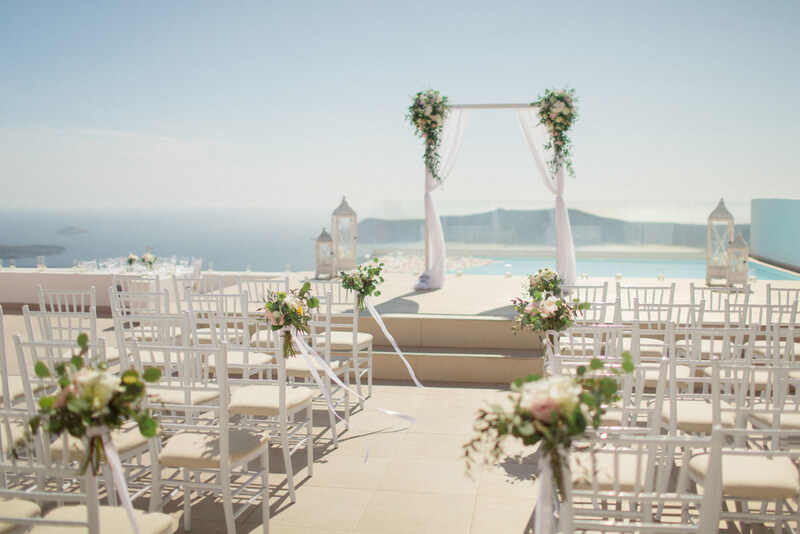In this world of ever-changing wedding trends, you might feel like you’ll need an enormous pile of cash to pull off your dream celebration—the experts know this to be true: “It can be easy for couples to stress about the impact budget is going to have on their wedding,” says Dantus. “Before they even get started, they’re already playing the comparison game.”
So, if you know you’ll be working with limited funds, an attitude reset is essential. “It’s not about what you have at your wedding,” says wedding expert Kim Gamez. “It’s truly about the ‘who’—you as a couple and the people there celebrating you. Dantus adds that you should always keep your “why” in mind, too: “During those early weeks of wedding planning, I always advise my couples to think about what is truly important to them, and why they’re embarking on this journey together,” she says. “Whatever the reason is, it’s important to be on the same page.” This overarching strategy comes in handy during the dozens of decisions you’ll make down the line. If the thing you’re thinking about splurging on doesn’t serve your “why,” then it might not be worth the money.
To help you prioritize where to spend—and where to cut—when planning a wedding on a budget, Dantus and Gamez offer these fundamental guidelines.
Setting a Budget
First things first, sit down and have a conversation as a couple about what you feel you can realistically afford. This might feel like an overwhelming process, but in order to ensure you don’t stretch yourself too thin, it’s a must for planning purposes.
Prioritizing Your Spending
“Deciding what is most important looks different for all couples,” says Gamez. Dantus agrees wholeheartedly, which is why she advises her couples to choose three categories for allocating bigger chunks of the budget. That way, a foodie couple can feel justified in spending extra on a food bar at the cocktail hour but doesn’t need to go overboard on decor elements like signage or the seating chart.
Finding Affordable Venues
“Every city or county has at least one county-run facility—usually a historic manor—and they’re designed for events,” says Dantus. “These are often overlooked, but are really beautiful places.”
Another option: getting hitched at home. Gamez shares that a recent report put out by Pearl indicates that 22 percent of brides surveyed were planning a backyard wedding, so the option is on the rise—and can be very cost-effective for micro weddings.
Saving on Food and Drinks
When it comes to catering service styles, buffets are typically the cheapest, followed by family style and then plated. For more personalization, you could go the food truck route instead. “Offer your favorites, like tacos or pizza,” suggests Gamez. “It ties the food to the couple, and sometimes it’s more inexpensive.”
For booze, forgo the open bar and “minimize to just beer and wine and maybe one or two signature cocktails,” says Dantus. “Or, have the open bar, but only during cocktail hour,” adds Gamez. If your venue allows it, it can also be economical to buy your own alcohol in bulk.
Shopping for a Wedding Dress on a Budget
Keep in mind that one of the major costs of a wedding can be the wedding dress—but it doesn’t have to be. If your dress isn’t the number one priority for the big day, consider buying a dress that feels really affordable to you, which will allow you to allocate those extra funds to something that feels really important. You can even consider renting!
Considering DIY Decorations
There are many ways to bring the costs down regarding wedding decorations for a budget-friendly wedding. If you like getting creative consider some simple DIY wedding decorations—and keep in mind that this can be done well ahead of the wedding (you can even get your bridal party involved if they’re into it!).
Saving on Music and Entertainment
“DJs are almost always going to be less than a band, and significantly so,” says Dantus. If you don’t have your heart set on live music, this is an easy way to save several thousand.

Other Money-Saving Tips
Here are a few other ways our experts suggest you can cut costs and plan a budget-friendly wedding.
Use In-Season Flowers
When it comes to florals, flexibility is key for lowering costs and pulling off an affordable wedding. “Suggest a color and an overall look, but leave it up to your florist to determine what’s in season, which will cut down on budget,” says Gamez.
Look for Built-In Décor at Your Venue
Take a look around your venue. Is there an existing arch or focal point you can hold your ceremony under instead of building out a floral arbor? “Or, if there’s a garden on-site, take advantage of that natural beauty and frame it with some smaller pops of décor here and there,” suggests Dantus.
Repurposing can also come in handy. “Maybe some aisle arrangements can be turned into reception tabletop décor,” Dantus adds. Her strategy isn’t limited to your own day, either. “Ask your vendor if they had to buy something special for another wedding,” Gamez says. “Also—can you tear down your own decor? That will save money.”
Consider Venue Inclusions
“The way to get the most bang for your buck with the venue is to look at inclusions,” says Dantus. “Tables and chairs on site are going to be a huge cost saving.” Other elements to consider: Can you get a deal on a multi-day rate if you also host your rehearsal dinner there? And is there space for both you and your partner to get ready?
If you have a dream venue in mind, there are multiple ways to shave off a few dollars here and there, but you need to be willing to negotiate. A few questions to ask, courtesy Gamez:
- Do you have any packages or promotions?
- Are there any cancellations that need to be filled?
- Are there times of the year or days of the week with lower rates?
- Do you offer discounts of any sort? (e.g. military discounts, AAA discounts, small business owner discounts)
- Can I get a discount if I pay the entire fee upfront and all at once?
Cut Non-Essentials
Despite what Pinterest and Instagram may suggest, add-ons such as welcome bags and wedding favors are just that: add-ons. They aren’t an essential part of the wedding day, so it’s totally fine to forgo anything you don’t feel attached to. “It’s important for couples to ask: Is this truly going to enhance our guest experience?” says Dantus. If you can envision your day without it, then it’s probably worth cutting.
Go Paperless Where Possible
“Some people love to touch stationery and have that experience,” says Dantus. “If it’s not a priority, there are many lovely low-cost and no-cost digital invitation options.”
“One of the most commonly forgotten expenses is postage,” adds Gamez. “Opt for digital RSVPs, and, instead of mailing out thank you cards, send video thank-yous.”
Steer Clear of Saturdays
The weekday wedding is on the rise, and it’s not just because of the post-COVID wedding surge. Venue rates are often cheaper on Fridays and Sundays, and even cheaper Monday through Thursday, which is leading many budget-conscious couples to opt for a non-Saturday soiree. “It’s not as taboo as it once was,” says Dantus. “As long as it works for the majority of your important guests and provides decent cost savings, it’s something to consider.”
Added bonus: “You can invite everyone but fewer people will be able to come,” says Gamez. “Instead of having to make the hard cuts yourself, doing it on an off-day can help thin out your guest count.”
Shrink Your Guest List
“Inviting fewer guests is one of the simplest ways to cut down on your wedding budget,” says Dantus. “More people means more food, more beverages, more rentals, and more service staff. All of those things drive up the cost.” That said, a small wedding might also give you the opportunity for upgrades or additions you wouldn’t have been able to pull off with a larger guest list, so it’s a double-win!
By Sarah Zlotnick





